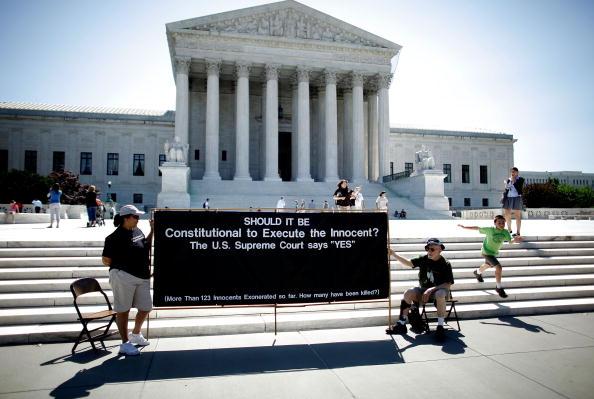WASHINGTON—A generation of people may not remember the day the death penalty was reinstated after years of being banned in the United States. Anna Shockley said she remembered the July 2, 1976 date clearly.
On the 37th anniversary of the 1976 Gregg v. Georgia decision that allowed executions to resume in the United States after being banned for four years, Shockley stood at the steps of the U.S. Supreme Court in Washington, D.C. with a group of anti-death penalty activists from all around the country. They fasted and protested there for five days, from June 29 through July 3.
Shockley is from South Carolina, part of the Abolitionist Action Committee. The group chose to start its protest June 29 because it was the anniversary of the 1972 case that banned the death penalty.
In the Furman v. Georgia decision, the Supreme Court found the death penalty was applied in an “arbitrary and capricious manner.’” Following that decision, over 600 prisoners had their death sentences reduced to life imprisonment and states were forced to rewrite their death penalty laws, according to AAC documents.
“I am against the death penalty everywhere,” said Shockley. “This issue is at the base of so many others. The government is saying that it can kill people.”
Since 1976, 1,338 people have been executed in the U.S. Of those executions, 500 took place in Texas.
Death penalty opponents cite innocence and wrongful execution as reasons that America should outlaw the death penalty. According to AAC, over 140 wrongly convicted people have been released from death row.
They also cite racial biases in the criminal justice system that they believe affect trial outcomes.
Understanding multiple aspects of the death row inmates’ experience, such as their trials, is important for anti-death penalty work, according to Emma Stitt of Georgia. Stitt, who participated in the protest at the Supreme Court, has an inmate pen pal and she encourages others to write to death row inmates.
“ It’s such a challenging experience as well,” said Stitt, referring to writing to death row inmates. “ You are getting to know about them … the whole person, rather than just news stories.” Stitt described an internal struggle in managing a relationship with a person who has committed serious crimes, but whom she feels should not be put to death.
Both state governments and the Supreme Court have the power to abolish the death penalty.
When the Supreme Court abolished the death penalty in 1972, the make-up of the Court was different, according to Richard Dieter, executive director of the Death Penalty Information Center.
“There were two judges that always voted against the death penalty in every case,” said Dieter.” I think that all of the justices on the court [today] see that a proper death penalty is allowed.”
According to Dieter, the death penalty cases that are now presented before the court are too narrow to result in an opinion that would ban the death penalty nationwide.
However, 18 states have banned the death penalty, according to the Death Penalty Information Center.
In the states that still execute prisoners, 2012 was marked by a decline in executions according to a DPI end of year report. Virginia, North Carolina and South Carolina, traditionally where the death penalty has been applied, had no executions or death sentences in 2012, according to the report.
Georgia set a July 15 execution date for Warren Hill, though his lawyers have asked the Supreme Court to review his case. Hill came within two hours of being executed in February. The 11th U.S. Circuit Court of Appeals in Atlanta rejected Hill’s request to be spared because of mental retardation, and the state set the new date. Hill murdered his girlfriend and later, another prison inmate.


